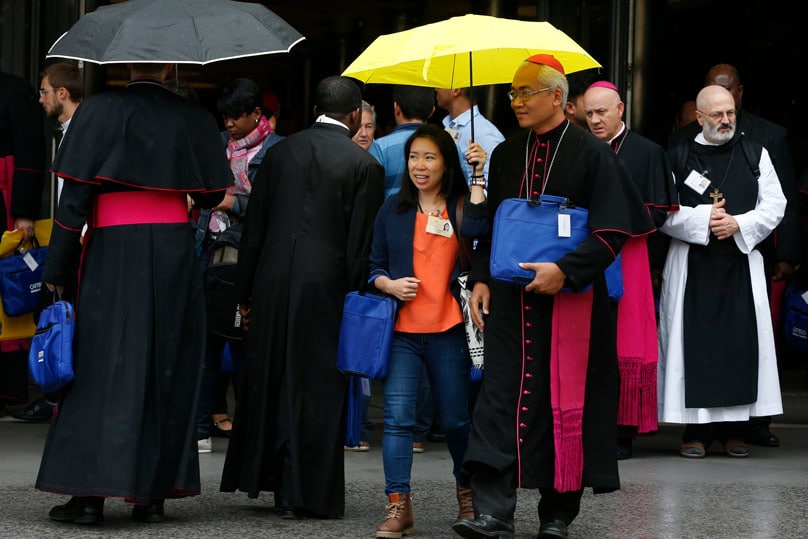
The last decade of the pontificate of Pope Paul VI, who will be canonised on Sunday, was not a happy one. The global controversy over his 1968 encyclical Humanae Vitae, which became quite rhetorically violent at times, had to have wounded Giovanni Battista Montini, a sensitive spirit. His teaching on the appropriate means of planning a family was often misrepresented as an ideology of “reproduction at all costs,” when in fact he taught that family planning was a moral obligation and a delicate exercise in the virtue of prudence. Many of his brother-bishops abandoned him amidst the Humanae Vitae wars, determined to push other moral-theological agendas or cowed by the ambient public culture and the sexual revolution. Faced with widespread and public dissent from his encyclical, the Pope seems to have made a conscious decision not to enforce doctrinal and moral discipline in the hope that rational discussion would prevent further divisions in the post-Vatican II Church. But that strategy, like his Ostpolitik of accommodation in east central Europe, failed; the results are much with us today, in the crisis of clerical sexual abuse and episcopal pusillanimity and malfeasance.
Pope Paul never wrote another encyclical. But toward the end of what had begun as a successful and dynamic pontificate and was ending in papal and ecclesial exhaustion, he rallied himself in an effort to put an end to the post-conciliar drift – and issued the first trumpet call summoning the Catholic Church to what his second successor, John Paul II, would call the “New Evangelisation.” It’s ironic, and may ultimately prove consoling, that this Sunday’s canoniSation will take place during a welcome pause in Synod-2018. For the occasion for Paul VI to challenge the world Church to its evangelical and missionary birthright was a failed Synod.
The Synod’s theme in 1974 was “Evangelisation in the Modern World,” and while there was agreement on the general proposition that the Church had to recover a sense that mission and evangelisation were every Christian’s responsibility, there was little consensus beyond that. Moreover, there was considerable disagreement on the relationship of evangelisation in the Third World to “liberation,” the meaning of which was also contested. As noted before in these LETTERS, the synodal Relator, Cardinal Karol Wojtyła of Cracow, was charged with developing a final report the entire Synod could accept, but was unable to do so. So Synod-1974 ended in some discord, its materials being handed over to a papal commission; the commission then passed things along to Paul VI with the suggestion that he do something. Pope Paul decided to do so. The result was the first-ever “Post-Synodal Apostolic Exhortation,” Evangelii Nuntiandi [Announcing the Gospel], which was published on December 8, 1975.
Drafted by the Brazilian Dominican Lucas Moreira Neves, the themes of Evangelii Nuntiandi clearly reflected the conviction embodied Giovanni Battista Montini’s papal name: the Church of the future had to be a Pauline or missionary enterprise. Thus Evangelii Nuntiandi outlined an approach to Catholic self-understanding in which the Church, the Mystical Body of Christ the First Evangeliser, was evangelical in its very essence: mission is what the Church is, not simply something the Church does. Moreover, Pope Paul insisted, this evangelical proclamation is not some generic call to human decency but a forthright and unapologetic call to meet the living person of Jesus Christ: “There is no true evangelization if the name, the teaching, the life, the promises, the kingdom, and the mystery of Jesus of Nazareth, the Son of God, are not proclaimed.” There could be no imposition here, but neither could there be timidity. The Church must proclaim Jesus Christ and his Gospel, and none other.
In discussing how that proclamation and that offer of friendship with Christ could best be done in late modernity, Paul VI struck a characteristic note, deploying in Evangelii Nuntiandi a formula he often used in his preaching and teaching: “Modern man listens more willingly to witnesses than to teachers, and if he does listen to teachers, it is because they are witnesses.” So there could be no distance between what the Church proclaimed and what the Church lived, or between what Christian disciples offered to others and the manner in which they conducted their own lives. Proposal and witness were of a piece: they formed a seamless garment, if you will, of evangelisation.

To meet Jesus Christ, Paul also insisted, was to meet the Church. To enter the Church was to be incorporated into a community of believers that lived by the sacraments, the fonts of grace that nourished faith, hope, and fraternal charity. And to be members of this sacramentally-ordered Church in the full sense, the evangelized had to become evangeliSers: the Church’s sacramental life was both a means of personal sanctification and a platform for mission, witness, and service. And in in becoming evangelists Christians also became transformers and renewers of culture, Paul taught. For the Christian offered the world a true and complete humanism, one in which the prerogatives of conscience and the demands of truth coincided, as the truth was freely accepted and lived in a reconciled and more deeply humanized world.
On the 25th anniversary of Evangelii Nuntiandi, Cardinal Lucas Moreira Neves described the apostolic exhortation as Paul VI’s “pastoral testament to the Church.” It was, arguably, more than that. It might even be suggested that Evangelii Nuntiandi was the prism through which Paul VI urged the Church to read the entirety of Vatican II: as John XXIII’s opening address, Gaudet Mater Ecclesia [Mother Church Rejoices] was his prescription for the Council’s work, Evangelii Nuntiandi was Pope Paul’s summary of the Council’s achievement and a prescription for living its sixteen documents as a coherent whole. In that sense, the last major teaching document of Paul VI’s magisterium sought to end the post-Vatican II drift in the Church and point Catholicism into a robustly evangelical future.
As the Synod fathers participate in Sunday’s canonization ceremonies in St. Peter’s Square, they might reflect on the sense of evangelical urgency that motivated Paul VI to write Evangelii Nuntiandi – a text that, along with the prophetic witness of Humanae Vitae, is one of the two magisterial bookends of a turbulent pontificate. “The love of Christ impels us….”, St. Paul writes in 2 Corinthians 5.14: that fiery love doesn’t suggest, or hint, orn nudge; it impels. Archbishop Charles Chaput of Philadelphia tried to ignite something like that Pauline flame in a mini-intervention offered during the early going of Syond-2018:
“We do need to listen to young people. This is vital. Peoples of all ages long to be heard. But St. Paul didn’t decide to ‘listen’ for a year when he got to Corinth. His faith would not let him wait. ‘Woe to me if I do not preach the Gospel:’ that was the fire in his heart; that was the kind of absolute confidence that led him to preach Jesus Christ from day one, whether people accepted or rejected him. He preached a Christ who insisted on radical conversion, but who liberated the soul precisely because of that conversion.”
That call to evangelical urgency is one which author of Evangelii Nuntiandi, who will soon be Pope St. Paul VI, would have approved.
– George Weigel
